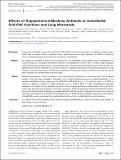Effects of Angiopoietin-2-Blocking Antibody on Endothelial Cell–Cell Junctions and Lung Metastasis
Author(s)
Tammela, Tuomas; Holopainen, Tanja; Saharinen, Pipsa; D’Amico, Gabriela; Lampinen, Anita; Eklund, Lauri; Sormunen, Raija; Anisimov, Andrey; Zarkada, Georgia; Lohela, Marja; Heloterä, Hanna; Benjamin, Laura E.; Ylä-Herttuala, Seppo; Leow, Ching Ching; Koh, Gou Young; Alitalo, Kari; ... Show more Show less
DownloadHolopainen-2012-Effects of Angiopoietin-2-Blocking.pdf (5.393Mb)
PUBLISHER_CC
Publisher with Creative Commons License
Creative Commons Attribution
Terms of use
Metadata
Show full item recordAbstract
Background: Angiopoietin-2 (Ang2), a ligand for endothelial TEK (Tie2) tyrosine kinase receptor, is induced in hypoxic endothelial cells of tumors, where it promotes tumor angiogenesis and growth. However, the effects of Ang2 on tumor lymphangiogenesis and metastasis are poorly characterized.
Methods: We addressed the effect of Ang2 on tumor progression and metastasis using systemic Ang2 overexpression in mice carrying tumor xenografts, endothelium-specific overexpression of Ang2 in VEC-tTA/Tet-OS-Ang2 transgenic mice implanted with isogenic tumors, and administration of Ang2-blocking antibodies to tumor-bearing immunodeficient mice. Fisher's exact test was used for analysis of metastasis occurrence, and repeated measures one-way analysis of variance was used for the analysis of primary tumor growth curves. Unpaired t test was used for all other analyses. All statistical tests were two-sided.
Results: Adenoviral expression of Ang2 increased lymph node and lung metastasis in tumor xenografts. The metastatic burden in the lungs was increased in transgenic mice in which Ang2 expression was induced specifically in the vascular endothelium (tumor burden per grid, VEC-tTA/Tet-OS-Ang2 mice [n = 5] vs control mice [n = 4]: 45.23 vs 12.26 mm[superscript 2], difference = 32.67 mm[superscript 2], 95% confidence interval = 31.87 to 34.07, P < .001). Ang2-blocking antibodies reduced lymph node and lung metastasis, as well as tumor lymphangiogenesis, and decreased tumor cell homing to the lungs after intravenous injection. In the lung metastases, Ang2 overexpression decreased endothelial integrity, whereas the Ang2-blocking antibodies improved endothelial cell–cell junctions and basement membrane contacts of metastasis-associated lung capillaries. At the cellular level, the Ang2-blocking antibodies induced the internalization of Ang2-Tie2 receptor complexes from endothelial cell–cell junctions in endothelial–tumor cell cocultures.
Conclusion: Our results indicate that blocking Ang2 inhibits metastatic dissemination in part by enhancing the integrity of endothelial cell–cell junctions.
Date issued
2012-02Department
Koch Institute for Integrative Cancer Research at MITJournal
JNCI Journal of the National Cancer Institute
Publisher
Oxford University Press (OUP)
Citation
Holopainen, T. et al. “Effects of Angiopoietin-2-Blocking Antibody on Endothelial Cell-Cell Junctions and Lung Metastasis.” JNCI Journal of the National Cancer Institute 104.6 (2012): 461–475.
Version: Final published version
ISSN
0027-8874
1460-2105